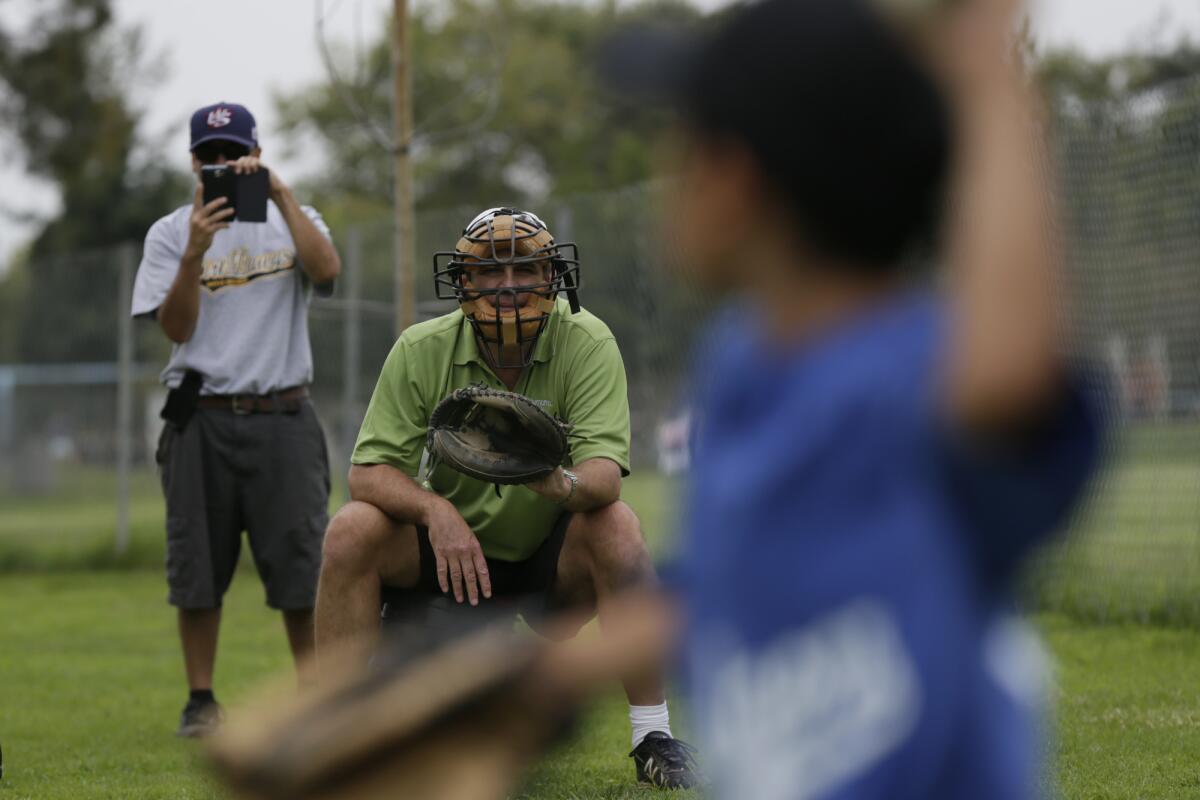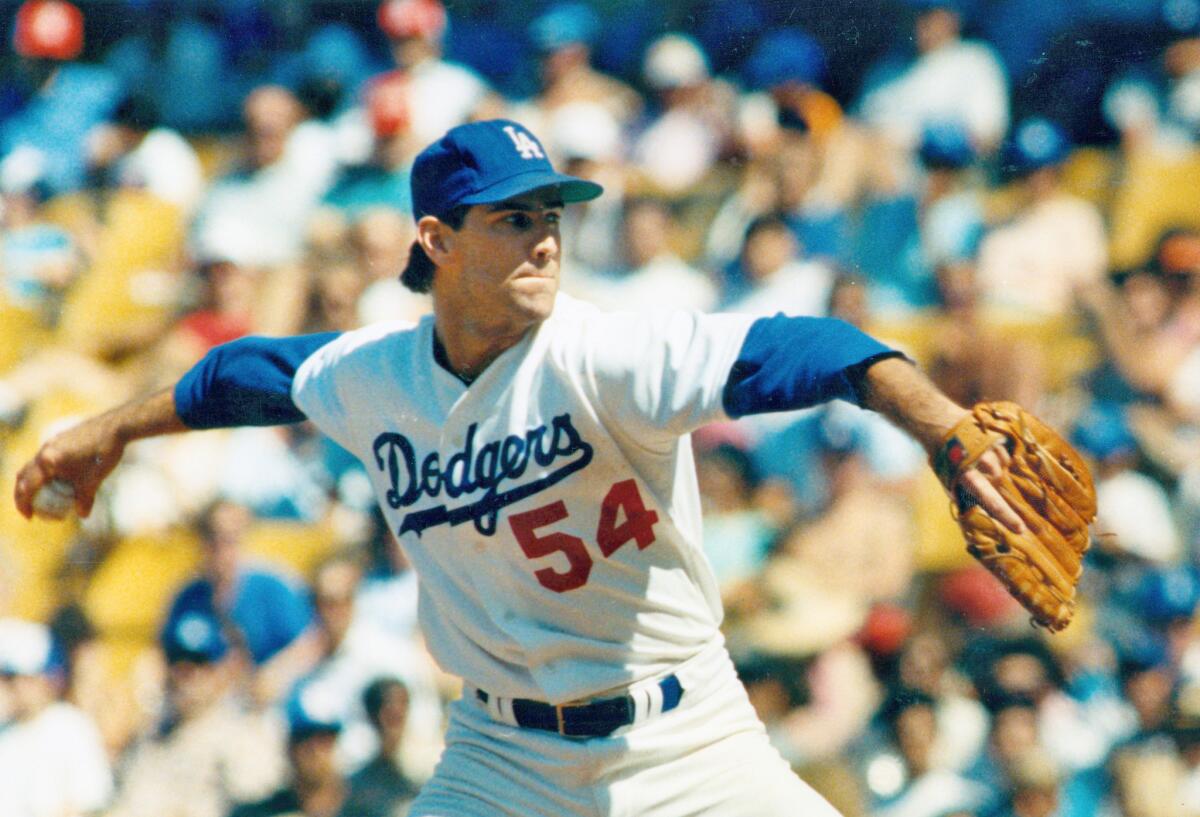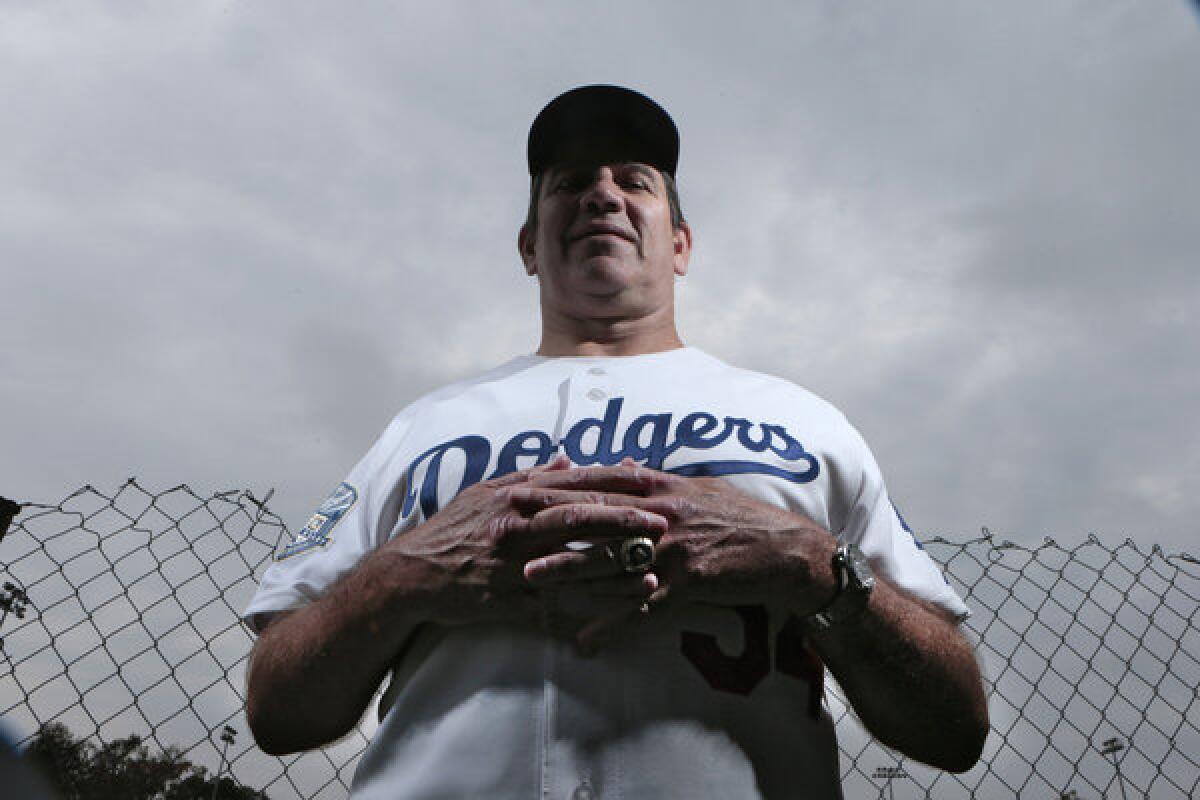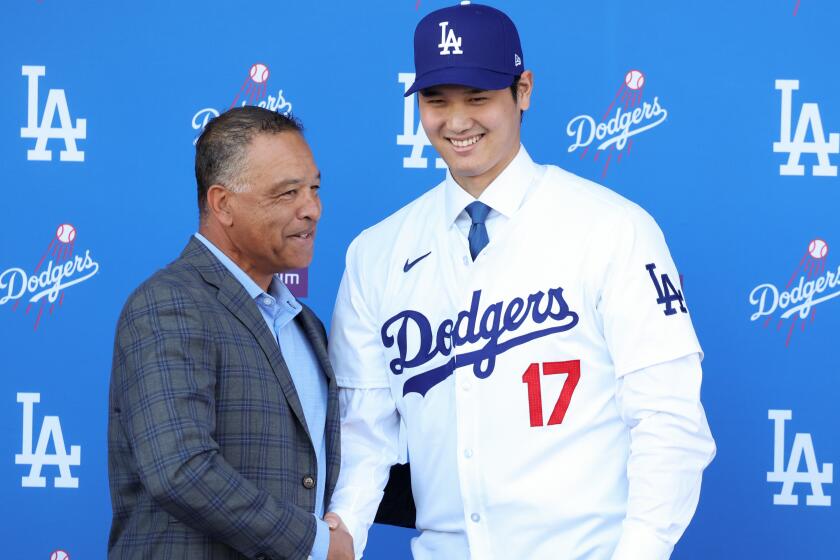For Tim Leary Dodgers’ 1988 championship season never ends
Pitcher Tim Leary had his winningest season in ‘88, when the Dodgers won the World Series. Today he’s still in L.A., happily keeping the dream alive.
On a gloriously bright Sunday afternoon in the middle of his championship season — one that never ends — Tim Leary is playing catch with a Dodger.
Only, it's a 6-year-old named Dodger Rios. They are playing in a crowded park on a strip of grass between a barbecue and a softball game. Leary is being paid $20.
"You can't make this stuff up," he says.
Leary sits on an upside-down plastic bucket. He wears a polo shirt adorned with the name of a healthcare company. His head is squeezed into a catcher's mask. He looks like just another middle-aged man giving a baseball lesson until, during a water break, he casually pulls off his faded catcher's mitt.
On his bare left hand sits the difference in this lesson, the definition of his life, a sparkling blue 1988 Dodgers World Series ring,
Leary glows. Dodger's dad swoons.
"I can't believe he's doing this," Robert Rios says. "I can't believe Tim Leary, world champion pitcher, has time to teach my little boy how to pitch."
Leary, 54, plops down on the bucket with a laugh. Twenty-five years later, it is Leary who still cannot believe.
"That thing never leaves my finger," he says.
Standing nearby is Leary's longtime girlfriend, Cindy Vandenbulcke. She is holding a Dodgers jersey that was made for Leary several years ago to fit his few extra pounds. The jersey he wore the night the Dodgers won the championship in Oakland is still hanging in a closet in his Santa Monica apartment. It was never again worn. It was never again even touched. It is still stained with champagne.
"The 1988 season was his greatest year, and he's been living that year over and over and over," Vandenbulcke says.
Like many on the 1988 world champion Dodgers, Leary's season was the unlikeliest of dreams. On a pitching staff dominated by Orel Hershiser, he was an overlooked bulldog. He had a career-best 17 wins and 2.91 earned-run average. He had six shutouts, as many as Clayton Kershaw has thrown in the last three years combined. He had nine runs batted in and was voted the best hitting pitcher in the league.
"Tim Leary was one of the many guys on that team with a hardened will, a guy who would do anything to win," Kirk Gibson says.
Leary was also one of the many guys on that team whose dream quickly faded. Whatever magic he may have possessed, it was as if he used every ounce of it in the summer of 1988. His pursuit of the shine seemingly drained him of any chance to shine again.

Former Dodgers pitcher Tim Leary holds an instructional session with Dodger Rios, 6, at Clover Park. Robert Rios, Dodger's father, shoots smartphone video as he pitches. (Robert Gauthier / Los Angeles Times) More photos
Leary stepped off that downtown parade float and back into the shadows. Before going 17-11 in 1988, he'd never had a winning record in the major leagues. In his final five seasons after '88, he had only one winning record, only one ERA below 4.00, and only one shutout.
In 1990, he lost 19 games for the New York Yankees before being removed from the rotation for the last two weeks of the season because the club didn't want him losing 20. The next year, he had an ERA of 6.49. Three years later, he gave up 19 runs in 21 innings with Texas and retired.
"I always felt I could have accomplished more," Leary says. "It's an unfortunate thing, but you get over it."
Most members of the improbable 1988 Dodgers got over it by scattering down the road and across the country, moving away from the site of their greatest triumph, seeking new challenges while ridding themselves of old ghosts. Even the greatest three of them left — Hershiser to television, Gibson to the Arizona desert, Mike Scioscia to Anaheim.
Yet Leary, a Santa Monica kid, stayed. He got over it by never getting over it. He stayed in town, and he stayed in 1988, and today he is still playing the season, still preaching the gospel, the local keeper of this most finicky of flames.
"Do you know how many people in this town have grown up without seeing a championship?" he says. "It was a magical thing. It brings out the 12-year-old in everybody. I love sharing that."
You want private baseball lessons from a guy who had a World Series ERA of 1.35? Leary gives about a handful every weekend, charging a dollar a minute.
"I know, I know, I could probably get more, but times have changed, and lots of kids don't have anybody to play catch with them these days," he says.
You want your group to be entertained by somebody whose three scoreless innings set the stage for Gibson's famous Game 1 home run? Leary is the most available member of the 1988 team who is part of the Dodgers' speakers bureau. He'll open your Little League season, ride in your community parade, go anywhere his ring still has value.
"For Tim, that year was kind of like his identity as a baseball player," says Fred Claire, former Dodgers general manager. "But then, for so many of them on that team, that was their identity as a baseball player."
I needed work. I needed to get better. I had to go to Tijuana."— Tim Leary
You want somebody to lead you in cheers for this year's Dodgers? Leary not only watches every game, but sends text messages to friends in which he waxes poetic about the team and predicts its greatness. During this current hot streak, he even sent out a text predicting they would win 98 games and challenge for another championship.
"Stacked deck of a team!!! they believe and they execute!…most exciting Dodger team that I can ever remember."
It was this dedication as a lifetime Dodgers fan — he has a photo of himself as an infant watching the 1959 World Series — that fueled Leary's sudden domination in 1988. The former UCLA star had been traded to his hometown team from the Milwaukee Brewers the previous season, yet in 1987 he had struggled under the pressure and gone 3-11 with a 4.76 ERA.
He was 28 years old. His mechanics were a mess. His confidence was shot. He had one more chance to rescue a forgettable career. Today, such a player might have spent the winter searching for steroids and a weight room.
Leary drove to Mexico. Every five days in the winter before the 1988 season, he drove 163 miles each way from Santa Monica to the border to pitch for Los Potros de Tijuana in the Mexican winter league.
Because most of the stadiums didn't have adequate shower facilities, he drove his truck in full uniform. He was stopped a couple of times at the border by disbelieving guards. He was carrying only toilet paper, instant coffee, and a desire to finally become the Dodgers pitcher of his childhood prayers.
"I was a steamroller, it was going to take almost death to make me not try as hard as I could," Leary says. "I needed work. I needed to get better. I had to go to Tijuana."

Dodgers pitcher Tim Leary in the 7th inning in game against Montreal Expos. Leary struck out 12 in 4-0 Dodger win. (Los Angeles Times) More photos
For a man who had been in the big leagues for parts of the previous six years, it was crazy. With all the weary late-night driving, it was dangerous.
"To this day, what he did that winter still amazes me," Claire says.
But it worked. He found a split-finger fastball. He found a swagger. He went 9-0 with a 1.24 ERA in Mexico and ended up being the surprise of Dodgers spring training.
"What he had done changed his career, and put him in place for the season of a lifetime," Claire remembers.
Leary went from being a fringe guy to the No. 2 starter behind Hershiser. He finished second on the team in wins while leading the team with 180 strikeouts. He peaked in late August and early September, with six wins in seven starts while carrying the Dodgers to their West Division clinch.
Then, almost as quickly as it ignited, his flame died. His arm grew tired. His focus waned. The effort he had expended in Mexico caught him from behind.
"I kind of ran out of gas," Leary says.
He gave it all … and then some."— Fred Claire, former Dodgers general manager
He had given everything for one full calendar year, from dusty Mexican ball yards to glittering Chavez Ravine, and by the end of the season there was little left. He didn't win a game after Sept. 12. He started one game against the New York Mets in the playoffs and couldn't get past the fourth inning. He did not start in the World Series, and was barely strong enough for six innings of relief.
"He gave it all," Claire says. "And then some."
Leary accepts the "then some" as the price of the ring. He has no regrets. He sees only rewards.
"Right after the end of that season, I remember saying, if my career ended today I'd be fine with it," Leary says.
Twenty-five years later, he is absolutely thrilled with it. You meet him for lunch and he brings along a giant silver bat commemorating his 1988 Silver Slugger Award. You walk the loge section at Dodger Stadium and he's sitting there yakking with fans.
He was never an All-Star. His career record was 78-105, with a 4.36 ERA. He received one Hall of Fame vote. He isn't even recognized when he attends UCLA basketball games. Yet this town has few champions more grateful or graceful.
"I've been out with Tim and you can see, he really savors this," Claire says.
For 10 years after he retired, Leary said he was plagued by dreams of trying to pitch again through a swampy haze, throwing his way toward a distant league he could never quite reach.
Then he woke up one day and realized, "This is my town. The Dodgers are my team. I'm right where I'm supposed to be."
On this day, the place is in the middle of Santa Monica's Clover Park, an old Dodger throwing with young Dodger, just another impossibility that happened in his eternal year of the improbable.
Are you a true-blue fan?
Get our Dodgers Dugout newsletter for insights, news and much more.
You may occasionally receive promotional content from the Los Angeles Times.





